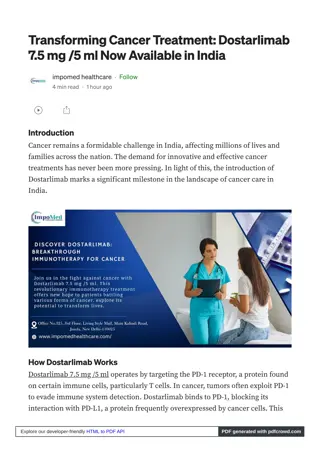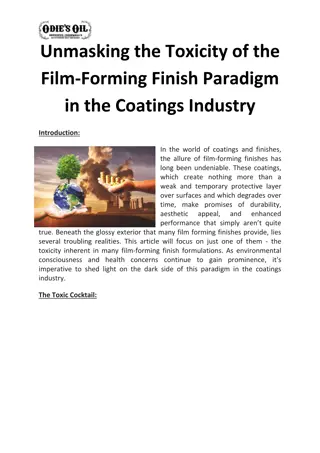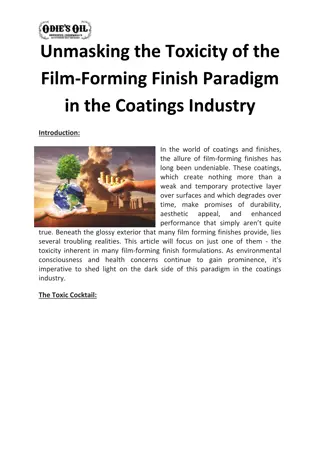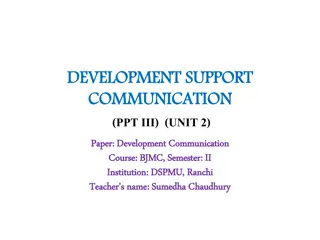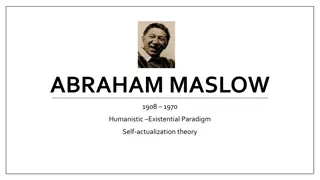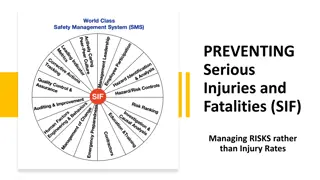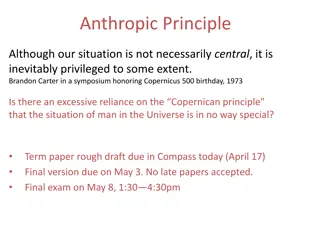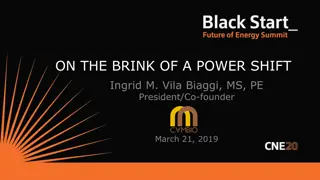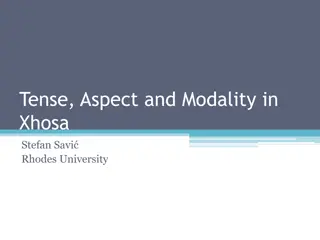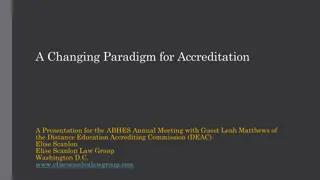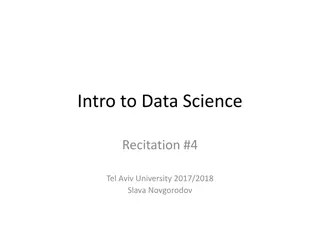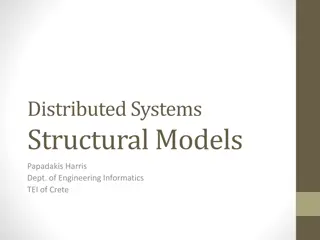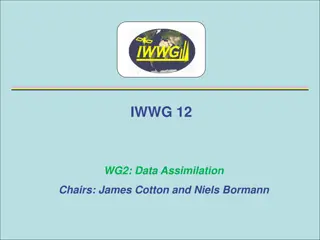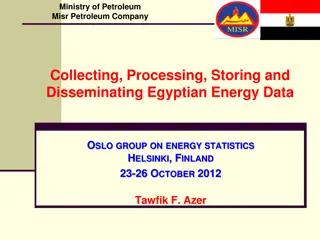
Understanding MIS Research Philosophy and Paradigms
Explore the world of MIS research philosophy and paradigms, delving into scientific research objectives, the research spiral, inductive and deductive reasoning, and the importance of researchable issues in MIS. Discover the magic word for elegance in research and the key to social science development through variable explanation.
Uploaded on | 0 Views
Download Presentation

Please find below an Image/Link to download the presentation.
The content on the website is provided AS IS for your information and personal use only. It may not be sold, licensed, or shared on other websites without obtaining consent from the author. If you encounter any issues during the download, it is possible that the publisher has removed the file from their server.
You are allowed to download the files provided on this website for personal or commercial use, subject to the condition that they are used lawfully. All files are the property of their respective owners.
The content on the website is provided AS IS for your information and personal use only. It may not be sold, licensed, or shared on other websites without obtaining consent from the author.
E N D
Presentation Transcript
2 MIS Research -- Research Philosophy and Paradigms Department of Information Management CYCU CK Farn mailto: ckfarn@gmail.com 2023.09 Reference:
Scientific Research Philosophy Objectives of Scientific Research Describe and Explain phenomena Predict phenomena Manipulate phenomena Knowledge develop in a spiral fashion How to decide on a researchable issue CK Farn, CYCU 2
Research Spiral observation Explain Phenomena Law Theory Derive Empirical evidence Hypothesis Conclusion Spiral up Objectives: describe, explain, predict, manipulate CK Farn, CYCU 3
Inductive and Deductive Reasoning 1 Inductive reasoning aims at developing a theory Deductive reasoning aims at testing an existing theory CK Farn, CYCU 4
Inductive and Deductive Reasoning 2 Inductive Deductive Theory Confirmation Hypothesis Observation CK Farn, CYCU 5
What is a Researchable Issue? What are the general issues in MIS? The study of the effective design, delivery and usage of information systems in organizations. --The MIS field as defined by Keen(1980) What is your dependent variable? Three questions to answer when setting an issue Why is it important (practically: relevance)? Why is it interesting (academically: elegance)? How do you contribute? CK Farn, CYCU 6
The magic word for Elegance: Parsimony Parsimony Frugal, stingy, Principle of parsimony that things are usually connected or behave in the simplest or most economical way the simplest of two competing theories is to be preferred The law of parsimony A problem-solving principle: the simplest explanation for something is typically the most likely Making use of simple concept to explain complicated things e.g. means, standard deviation, CK Farn, CYCU 7
Research Issue? The key to social science development is to explain some variables in real-world phenomena With few variables Why the variable changes in different context? What are other factors that may affect it? (to explain) What are other factors that may co-exist with it? (to predict) The focus is call dependent variable Y The determinants are independent variables X Examples System success, resistance System reliability Purchase behavior CK Farn, CYCU 8
Some things to think about Clarify what you are trying to answer What fact finding, natural laws How events, process Why theory Research is a cumulative process Do not expect an independent research to have a earth shaking break-through Base you research on previous results Build on top of a cumulative tradition CK Farn, CYCU 9
Descriptive and Normative Models Descriptive model Describe how people actually behave what? how? why? e.g. In a traffic accident involving motorcycles, does wearing helmet affect mortality rate? Normative (prescriptive) model prescribe how one should behave; that is, they set ideal norms e.g. Should we enforce wearing helmet when riding motorcycles? Differences Descriptive model reflect the real world Normative model involve judgement, and one s value systems, is a matter of decision analysis, and cannot be a good research topic Only descriptive modes are researchable CK Farn, CYCU 10
Research Paradigm Theoretical Research Variance (Quantitative) Research Social Science Research Empirical Research Qualitative Research MIS Research Pioneering Engineering Research Incremental Improvement CK Farn, CYCU 11
Social Science Research 1: Theoretical Research Based on inductive reasoning Logical derivation Mathematical inferencing Making sense, pattern recognition It is a zig-saw puzzle: only if this is the case, these observations can fit Meta analysis of past researches e.g. Periodic Table of Elements CK Farn, CYCU 12
Periodic Table of Elements CK Farn, CYCU 13
Social Science Research 2: Empirical Research Analysis of real-world observations and data Observations of active/passive objects Information by informants (Q&A) Data collected by others, data banks Making sense out of the data Data can be quantitative of qualitative Deductive reasoning CK Farn, CYCU 14
Types of Empirical Research By stages Exploratory ( ) research, Theory/ Hypothesis building Darwinian theory of evolution (The origin of species) Positivism, Confirmatory ( ) research, Hypothesis testing Galileo s gravity experiment By data collection and analysis methods Quantitative (variance) research Qualitative research The research question determines the right methodlogy Many methodologies beyond survey CK Farn, CYCU 15
Empirical Research Quantitative (variance) research Experiment, Quasi-experimentation Observation Survey Content analysis Qualitative research Anthropology, historical research Ethnography Participant observation Case study CK Farn, CYCU 16
Statistical analysis Descriptive statistics Correlational analysis Multivariate analysis Time series analysis Regression analysis Causal analysis Factor analysis, cluster analysis SEM: Structural Equation Analysis . CK Farn, CYCU 17
Engineering Paradigm 1: Pioneering Imagine it is now Dec 17, 1903. You were invited to an event at Outer banks, North Carolina by the Wright brothers They showcased their first ever airplane flight in the world Is a Research? How do one justify it? CK Farn, CYCU 18
Engineering Paradigm 2: Incremental Improvement Imagine it is now September 2023, you work for an AI research organization You come out with a new approach of achieving generative AI reasoning, and claim to be better than ChatGPT Is it a good research? Better in what sense? Faster? More accurate? More responsive? . How do one justify it? CK Farn, CYCU 19
Justifying improvement One have to rely on social science research to justify the results Example: the MYCIN expert system Prof Ed Feigenbaum of Stanford University in 1965 Diagnosing infectious (blood) diseases Making use of lab experiments to justify its performance in comparison to human doctors Even Engineering research has a Y CK Farn, CYCU 20
In setting a research issue What is the major dependent variable (Y)? What are the related reference disciplines At what stage this variable have been studied? What knowledge have been accumulated? What is the stage of application of the target technology If you want to study the adoption of 5G communications, it is too early! CK Farn, CYCU 21
Some of the possible frameworks Theoretical Development Systems Building Field Studies Lab Experiments Empirical Research 22
Assignment #2: pose a Research Question Pick a topic you like, which is specific and focused enough Pick a term or construct that you are interested Look into Google Scholar, and briefly browse through what previous researchers have accomplished Determine a Y Provide a statement in Question form Prepare a ONE page ppt document File name: HW2_SID_Name.ppt Upload your ppt file to https://mega.linkin.tw/index.php/s/pYxAcPeW5NeoxQn CK Farn, CYCU 23

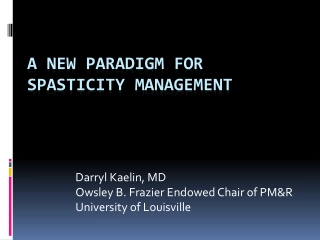
![[PDF⚡READ❤ONLINE] Black Hole Astrophysics: The Engine Paradigm (Springer Praxis](/thumb/21503/pdf-read-online-black-hole-astrophysics-the-engine-paradigm-springer-praxis.jpg)
